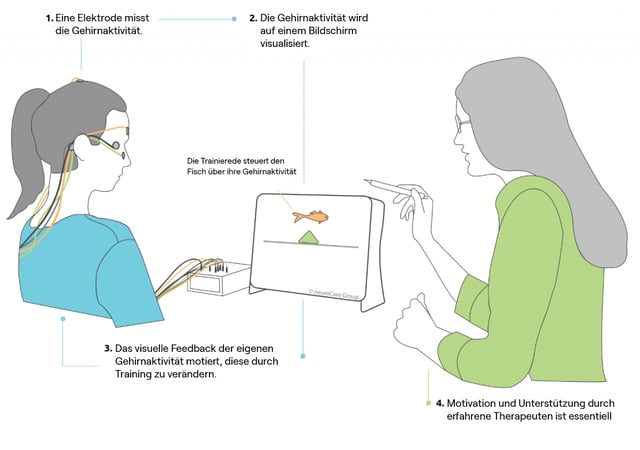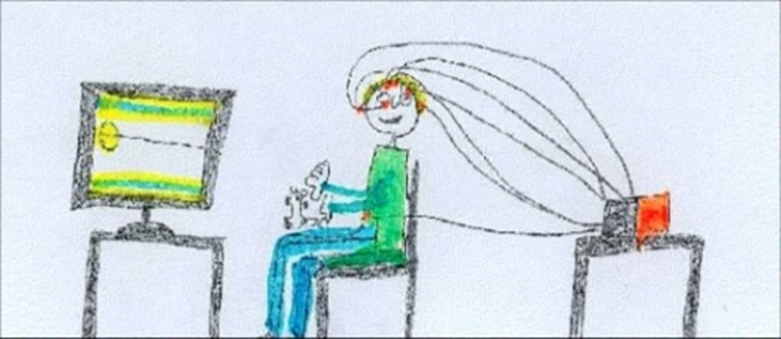Neurofeedback bei ADHS

Direkt zu:
Durch Neurofeedback den Alltag meistern - trotz ADHS
Mit Neurofeedback gibt es eine sanfte, nicht-medikamentöse und schmerzfreie Therapie, um die Aufmerksamkeitsdefizit-/ Hyeraktivitätsstörung, kurz ADHS erfolgreich zu behandeln. Von Psychotherapeuten, Kinder- und Jugendpsychiatern oder Ergotherapeuten professionell durchgeführt, verringert sie nicht nur die Symptome, sondern setzt an der Ursache der Störung an. Betroffene lernen, ihre Hirnaktivität wahrzunehmen und selbst zu beeinflussen. Dauerhaft.
Die folgenden Seiten stellen Neurofeedback als Therapiemethode vor. Je früher Menschen mit ADHS behandelt werden, desto besser können sie und ihre Angehörigen lernen, mit dieser Herausforderung zu leben und ihren Alltag zu meistern.
Was ist Neurofeedback?
Bei der Neurofeedbacktherapie handelt es sich um eine sehr sanfte, schmerzfreie Therapieform zur Behandlung von z. B. ADHS. Sie wird von Psychologen, Psychotherapeuten und Ergotherapeuten durchgeführt und bekämpft nicht nur die Symptome, sondern setzt an der Ursache der Störung an.
Wissenschaftliche Grundlage der Methode ist das Biofeedback: Dabei werden Veränderungen von Körperprozessen wie Puls oder Blutdruck mithilfe von Geräten sichtbar gemacht. Im Fall von Neurofeedback ist es die Gehirnaktivität, die gemessen und dem Patienten über einen Monitor „zurückgemeldet“ wird.
Gedanken bewegen
Ziel dieser Methode ist es, dass die Patienten lernen, diese normalerweise unwillkürlichen Aktivitäten bewusst zu kontrollieren und zu beeinflussen. So, wie sie als kleine Kinder Laufen oder Radfahren gelernt haben, verinnerlichen sie beim Neurofeedback, wie sie sich verhalten müssen, um einen aufmerksamen oder entspannten Zustand herzustellen. Dabei bezieht der Therapeut den Patienten aktiv in die Behandlung mit ein.
Die Behandlung umfasst in der Regel 20 bis 40 Sitzungen. In Einzelfällen können aber auch deutlich mehr Sitzungen erforderlich sein. Anschließend ist keine weitere Behandlung mehr notwendig. Zusätzlich zu den Sitzungen in der Praxis sollte der Patient zu Hause mit speziellen Trainingskarten und -videos den Transfer in den Alltag üben.
Keine Nebenwirkungen
Neurofeedback sollte als ein Baustein in einem multimodalen Behandlungskonzept integriert werden. Bei Patienten, die bereits medikamentös behandelt werden, kann Neurofeedback parallel eingesetzt werden. Im Gegensatz zu Medikamenten hat das Neurofeedback bei richtiger Anwendung keine wirklichen Nebenwirkungen. Ziel der Behandlung ist eine dauerhafte positive Veränderung des Verhaltens sowie der Steuerung von Aufmerksamkeit und Impulskontrolle.
Neurofeedback ist wissenschaftlich anerkannt und seine Wirksamkeit bei ADHS und anderen Erkrankungen in mehreren Studien belegt.
Ziel und Wirkung von Neurofeedback
Ziel des Neurofeedbacks ist es, die Patienten zu befähigen, ihre eigene Hirnaktivität so zu beeinflussen, dass sie Reize gezielter verarbeiten und Aufgaben besser bewältigen können. Dies geschieht, indem sie lernen, ihre hirnelektrischen Signale bewusst zu steuern, das heißt sich abwechselnd in einen aufmerksamen und einen entspannten Zustand zu versetzen.
Das Prinzip des Neurofeedbacks beruht dabei auf der positiven Verstärkung: Gelingt es den Patienten, ihre Gehirnaktivität in die richtige Richtung zu lenken, wird ihnen dies unmittelbar über den Monitor zurückgemeldet und dieser Erfolg entsprechend belohnt. So lernen die Trainierenden nach und nach, ihre Gehirnaktivität zu steuern und sich selbst zu regulieren. Langfristig wird dieses Verhalten automatisiert und auf Alltagssituationen übertragen.
Neurofeedback-methoden

Eine wichtige Form des Neurofeedbacks ist das so genannte SCP-Neurofeedback. Dabei lernen die Patienten, ihre langsamen kortikalen Potenziale zu regulieren und bestimmte Hirnregionen so zu aktivieren, dass sie eine bevorstehende Aufgabe bewältigen können.
Darüber hinaus gibt es das Training verschiedener Frequenzbänder wie das Theta/Beta-Neurofeedback. Diese Methode soll die Beta-Anteile im EEG, die bei ADHS-Patienten zu niedrig sind, erhöhen und gleichzeitig die Theta-Anteile im EEG, die oft zu hoch sind, verringern.
Das so genannte SMR-Neurofeedback schult den sensomotorischen Rhythmus.
Die folgenden Seiten informieren vor allem über das SCP-Neurofeedback.
Wie wirkt das SCP-Neurofeedback bei ADHS
Zahlreiche wissenschaftliche Untersuchungen haben belegt, dass es zwischen bestimmten Aktivitätsmustern im Gehirn des Menschen und seinem Verhalten Zusammenhänge gibt. So haben Wissenschaftler unter anderem herausgefunden, dass das zentrale Nervensystem von Menschen mit ADHS anders auf innere und äußere Reize reagiert.
Bei gesunden Menschen, die ein Ereignis erwarten oder sich auf eine Aufgabe vorbereiten, verschieben sich die langsamen hirnelektrischen Signale im EEG, die sogenannten langsamen kortikale Potentialen (man spricht auch von den Slow Cortical Potentials - SCPs), in die elektrisch negative Richtung (Negativierung). Ihre Hirnrinde, der Kortex, ist erregt und aktiviert. Diese negativen SCPs stehen also für eine erhöhte Aufmerksamkeit des Gehirns und drücken sich im Verhalten in schnellen Reaktionen und erhöhter Aufmerksamkeit aus. Wenn das Gehirn eher weniger erregt bzw. entspannt ist, kann man eine elektrische Positivierung der SCPs (Verschiedung in elektrisch positive Richtung) im EEG messen. In diesem Zustand werden Reize weniger gut verarbeitet und man braucht eher länger, um zu reagieren. Im Gehirn gibt es einen ständigen langsamen Wechsel zwischen diesen beiden Zuständen.
Bei Menschen mit ADHS funktioniert die Regulierung der SCPs weniger gut und vor allem die Negativierung, also die Aktivierung der Hirnaktivität, findet auf einem niedrigeren Niveau statt. Das heißt, ihnen steht weniger Energie zur Verfügung, um Reize zu verarbeiten und eine bevorstehende Aufgabe zu bewältigen. Dies wiederum führt dann zu Unaufmerksamkeit und Impulsivität.
Ich bin Therapeut
Erfahren Sie mehr über unsere innovativen Technologien und unsere Fortbildungsakademie für Medizinern und Forschern.
Ich bin Investor
Erfahren Sie mehr über unser Team, unsere Geschichte und unsere Mission innovative Medizin anzubieten.
Bleiben Sie auf dem Laufenden über unsere Therapiezentren und DTP
Bleiben Sie auf dem Laufenden über unsere Therapiezentren und DTP
Copyright © neurocare group AG 2024


